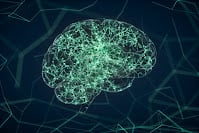Low-Frequency TMS Improves Schizophrenia-Related Psychomotor Symptoms

Low-frequency transcranial magnetic stimulation (TMS) can improve symptoms of psychomotor slowing in individuals with schizophrenia, reports a study in JAMA Psychiatry. Psychomotor slowing involves impairment of both fine and gross motor movements, making tasks like walking or talking difficult.
“Psychomotor slowing often comes with multiple disadvantages, such as cognitive impairment, sedentary behavior, cardiometabolic risks, poor quality of life, lower subjective well-being, and impaired functioning,” wrote Sebastian Walther, M.D., and colleagues at the University of Bern, Switzerland. The researchers noted that there are no specific treatments for psychomotor slowing but hypothesized that targeting the supplementary motor area of the brain with TMS might be a promising approach.
Walther and colleagues enrolled 88 adults (aged 18 to 60) with schizophrenia spectrum disorder and severe psychomotor slowing, defined as a score of 15 or more on the Salpêtrière Retardation Rating Scale. The participants were evenly divided to receive low-frequency repetitive TMS (rTMS at 1 hertz), high-frequency intermittent theta burst stimulation (iTBS at 50 hertz), or sham stimulation or to be placed on a waiting list. All stimulation protocols involved 15 sessions across three weeks; after three weeks, the wait list group received rTMS. Participants were allowed to continue taking their existing medications.
After three weeks, 68% of adults who received rTMS responded to treatment, defined as at least a 30% improvement in Salpêtrière Retardation Rating Scale scores. By comparison, 36% of iTBS recipients, 32% of sham participants, and 18% of adults on the waitlist responded. After adjusting for demographic variables and medication use, the researchers estimated someone receiving rTMS had more than 80% greater odds of responding than someone receiving iTBS or sham.
Walther and colleagues also noted that 63% of the waitlist group responded to rTMS once they got the treatment. Additionally, no participants reported experiencing severe adverse events, with the most common side effects being fatigue and head/neck pain.
To read more about psychomotor problems, see the Psychiatric News article “Comprehensive Catatonia Guideline Released.”
(Image: Getty Images/iStock/imaginima)
Don't miss out! To learn about newly posted articles in Psychiatric News, please sign up here.





